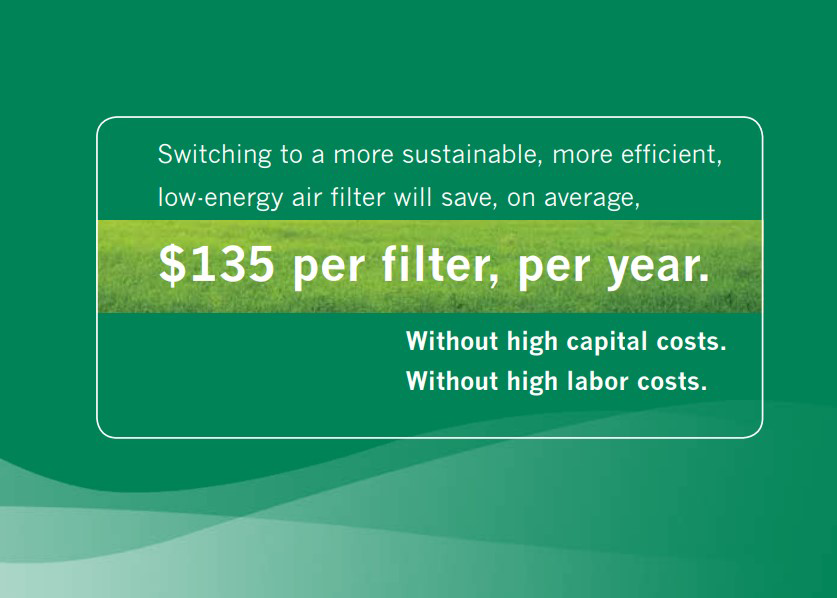With energy costs at an all-time high in recent years, it is more important than ever for building owners, property managers, and facilities managers to find ways to reduce energy costs. In buildings, air filtration systems are responsible for a significant amount of energy consumption. This is especially true if your HVAC system is not operating efficiently. One of the best ways to reduce energy consumption in your building is to use an efficient, well-functioning air filtration system. But how do you get there? In this article, we explore 5 ways you can save energy with your HVAC system.

1. Save energy in your HVAC system by choosing a modern air filtration system
As HVAC systems get older, they become less efficient and can start to break down more often. Replacing an old HVAC system with a new, more energy-efficient model can save you money on your energy bills and provide better indoor air quality. It is also possible to upgrade your HVAC system for energy savings without completely replacing it. When it comes to saving energy, your air filtration system is one of the most important components in your building.
Modern air filtration solutions incorporate cutting-edge technology to not only save a maximum amount of energy but also remove a greater amount of harmful contaminants from indoor air than ever before. Installing a new HVAC system may be expensive at first, but it can save a considerable amount of money over five to ten years. It can also reduce your carbon footprint and contribute to a better environment. Lastly, a modern air filtration solution will result in less time performing maintenance tasks involving your HVAC system.
2. Use a Variable Frequency Drive (VFD) controlled fan in your air filtration system
One way to improve the efficiency of your ventilation system is to install variable frequency drive (VFD) controlled fans in tandem with high-quality air filters. VFDs with variable-speed fans can be adjusted to match the airflow required by the building. This results in significant energy savings because the fan can operate at different speeds throughout the day depending on demand and its speed can be reduced when fewer occupants are present in a building.
In addition to energy savings, VFD-controlled fans also offer other benefits. They can help to reduce HVAC noise levels, and they also offer greater control over airflow. If you are looking for ways to save energy and improve the efficiency of your building, using VFD-controlled fans is a great option. Just remember, without an air filter optimized to work with a VFD, you cannot reduce air filtration-related energy consumption.
3. Use a high-quality air filter
A high-quality air filter can make a big difference in the efficiency of your air filtration system, and can save you money on your energy bills.
There are a few things to keep in mind when installing a high-quality air filter:
- Make sure the air filter is the right size for your system. An air filter that is improperly sized may impede airflow and reduce the efficiency of your system
- Make sure the filter is rated for the appropriate filtration level (MERV ratings in Canada). A higher quality filter will remove more pollutants from the air and will be more efficient at it
- Replace your air filter on time. A dirty or clogged filter will reduce the efficiency of your HVAC system and can cause it to break down and require more maintenance
- Use a longer-lasting air filter. A high-quality air filter will do its job efficiently for a longer period of time, saving money on replacement costs and energy bills
Media used in high-quality, modern air filters is constantly evolving. The materials used continue to improve, offering higher efficiency and better indoor air quality. Look for an air filter manufacturer that is committed to energy savings and can offer you products with the lowest average pressure drop (see case study on cost savings) to ensure that the maximum contaminant amounts are removed and maximum airflow is achieved.
4. Ensure that the components in your air filtration system are working properly
Make sure your building ductwork is well-sealed and insulated. This will help reduce the amount of energy required to move the air around. Using a humidifier during the winter will reduce the amount of energy required to heat the air. Using ceiling fans to circulate the air in your building can help reduce the amount of energy required to cool the air in summer.
5. Conduct an energy audit
An air filtration expert can conduct an energy use audit to assess your current system and give you recommendations for improving its efficiency and determining how much energy you can save. An filtration expert can advise if your current air filtration system can be retrofitted and upgraded to save a substantial amount of energy, or if installing a new system will be the best route over the long term. You can also do a quick check here Air Filter Cost Comparison.
To consult with an air filtration expert on any of these energy-saving methods or for further information, please use this contact form and an air filtration expert from Camfil will answer any questions you may have.
For more information or to see some cost-saving illustrations, please see our article on How to Save Energy with Air Filters on our Clean Air website where you can find a variety of air filtration topics.
About Camfil Canada Clean Air Solutions
For more than half a century, Camfil has been helping people breathe cleaner air. As a leading manufacturer of premium clean air solutions, we provide commercial and industrial systems for air filtration and air pollution control that improve worker and equipment productivity, minimize energy use, and benefit human health and the environment. Read more about Camfil Canada
##
Media Contact:
Phillip Ilijevski
Camfil Canada Inc.
T: 437-929-1161
For more interesting stories, check out our LinkedIn company page: Camfil Canada Air Filtration Company | LinkedIn
